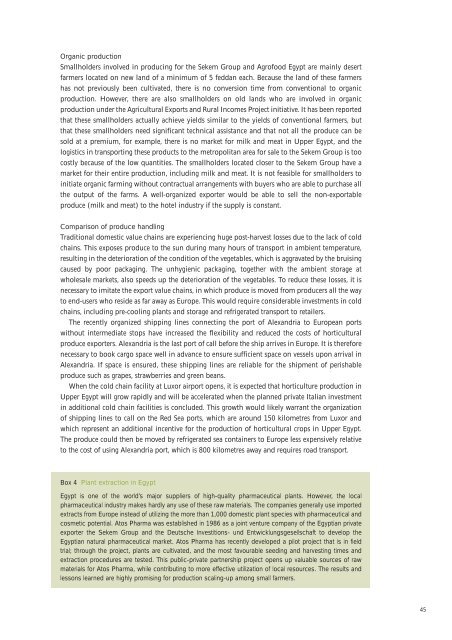Egypt: Smallholder contract farming for high-value and ... - IFAD
Egypt: Smallholder contract farming for high-value and ... - IFAD
Egypt: Smallholder contract farming for high-value and ... - IFAD
Create successful ePaper yourself
Turn your PDF publications into a flip-book with our unique Google optimized e-Paper software.
Organic production<br />
<strong>Smallholder</strong>s involved in producing <strong>for</strong> the Sekem Group <strong>and</strong> Agrofood <strong>Egypt</strong> are mainly desert<br />
farmers located on new l<strong>and</strong> of a minimum of 5 feddan each. Because the l<strong>and</strong> of these farmers<br />
has not previously been cultivated, there is no conversion time from conventional to organic<br />
production. However, there are also smallholders on old l<strong>and</strong>s who are involved in organic<br />
production under the Agricultural Exports <strong>and</strong> Rural Incomes Project initiative. It has been reported<br />
that these smallholders actually achieve yields similar to the yields of conventional farmers, but<br />
that these smallholders need significant technical assistance <strong>and</strong> that not all the produce can be<br />
sold at a premium, <strong>for</strong> example, there is no market <strong>for</strong> milk <strong>and</strong> meat in Upper <strong>Egypt</strong>, <strong>and</strong> the<br />
logistics in transporting these products to the metropolitan area <strong>for</strong> sale to the Sekem Group is too<br />
costly because of the low quantities. The smallholders located closer to the Sekem Group have a<br />
market <strong>for</strong> their entire production, including milk <strong>and</strong> meat. It is not feasible <strong>for</strong> smallholders to<br />
initiate organic <strong>farming</strong> without <strong>contract</strong>ual arrangements with buyers who are able to purchase all<br />
the output of the farms. A well-organized exporter would be able to sell the non-exportable<br />
produce (milk <strong>and</strong> meat) to the hotel industry if the supply is constant.<br />
Comparison of produce h<strong>and</strong>ling<br />
Traditional domestic <strong>value</strong> chains are experiencing huge post-harvest losses due to the lack of cold<br />
chains. This exposes produce to the sun during many hours of transport in ambient temperature,<br />
resulting in the deterioration of the condition of the vegetables, which is aggravated by the bruising<br />
caused by poor packaging. The unhygienic packaging, together with the ambient storage at<br />
wholesale markets, also speeds up the deterioration of the vegetables. To reduce these losses, it is<br />
necessary to imitate the export <strong>value</strong> chains, in which produce is moved from producers all the way<br />
to end-users who reside as far away as Europe. This would require considerable investments in cold<br />
chains, including pre-cooling plants <strong>and</strong> storage <strong>and</strong> refrigerated transport to retailers.<br />
The recently organized shipping lines connecting the port of Alex<strong>and</strong>ria to European ports<br />
without intermediate stops have increased the flexibility <strong>and</strong> reduced the costs of horticultural<br />
produce exporters. Alex<strong>and</strong>ria is the last port of call be<strong>for</strong>e the ship arrives in Europe. It is there<strong>for</strong>e<br />
necessary to book cargo space well in advance to ensure sufficient space on vessels upon arrival in<br />
Alex<strong>and</strong>ria. If space is ensured, these shipping lines are reliable <strong>for</strong> the shipment of perishable<br />
produce such as grapes, strawberries <strong>and</strong> green beans.<br />
When the cold chain facility at Luxor airport opens, it is expected that horticulture production in<br />
Upper <strong>Egypt</strong> will grow rapidly <strong>and</strong> will be accelerated when the planned private Italian investment<br />
in additional cold chain facilities is concluded. This growth would likely warrant the organization<br />
of shipping lines to call on the Red Sea ports, which are around 150 kilometres from Luxor <strong>and</strong><br />
which represent an additional incentive <strong>for</strong> the production of horticultural crops in Upper <strong>Egypt</strong>.<br />
The produce could then be moved by refrigerated sea containers to Europe less expensively relative<br />
to the cost of using Alex<strong>and</strong>ria port, which is 800 kilometres away <strong>and</strong> requires road transport.<br />
Box 4 Plant extraction in <strong>Egypt</strong><br />
<strong>Egypt</strong> is one of the world’s major suppliers of <strong>high</strong>-quality pharmaceutical plants. However, the local<br />
pharmaceutical industry makes hardly any use of these raw materials. The companies generally use imported<br />
extracts from Europe instead of utilizing the more than 1,000 domestic plant species with pharmaceutical <strong>and</strong><br />
cosmetic potential. Atos Pharma was established in 1986 as a joint venture company of the <strong>Egypt</strong>ian private<br />
exporter the Sekem Group <strong>and</strong> the Deutsche Investitions- und Entwicklungsgesellschaft to develop the<br />
<strong>Egypt</strong>ian natural pharmaceutical market. Atos Pharma has recently developed a pilot project that is in field<br />
trial; through the project, plants are cultivated, <strong>and</strong> the most favourable seeding <strong>and</strong> harvesting times <strong>and</strong><br />
extraction procedures are tested. This public-private partnership project opens up valuable sources of raw<br />
materials <strong>for</strong> Atos Pharma, while contributing to more effective utilization of local resources. The results <strong>and</strong><br />
lessons learned are <strong>high</strong>ly promising <strong>for</strong> production scaling-up among small farmers.<br />
45

















